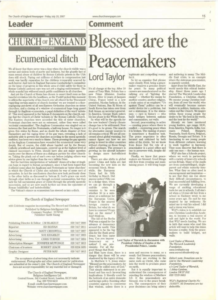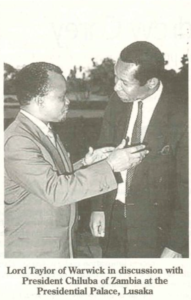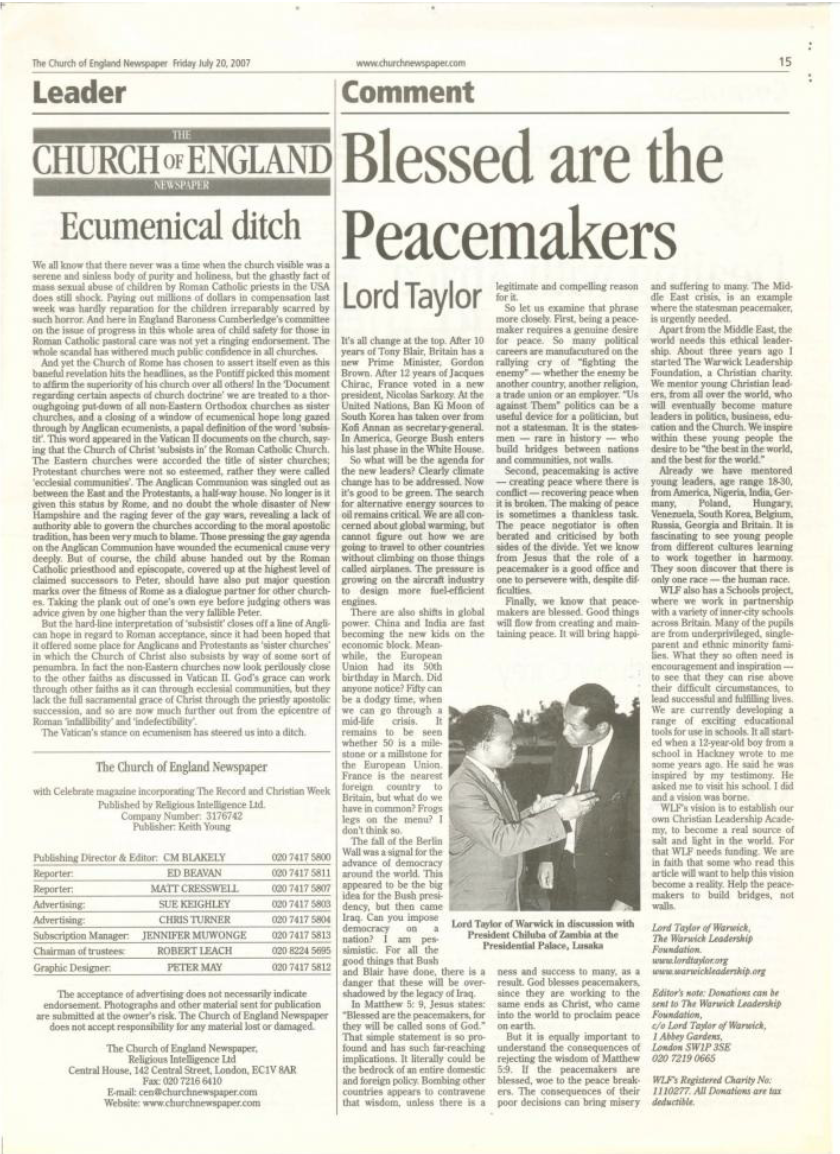Church of England Article By Lord Taylor of Warwick
 It’s all change at the top. After 10 years of Tony Blair, Britain has a new Prime Minister, Gordon Brown. After 12 years of Jacques Chirac, France voted in a new president, Nicolas Sarkozy. At the United Nations, Ban Ki Moon of South Korea has taken over from Kofi Annan as secretary-general. In America, George Bush enters his last phase in the White House.
It’s all change at the top. After 10 years of Tony Blair, Britain has a new Prime Minister, Gordon Brown. After 12 years of Jacques Chirac, France voted in a new president, Nicolas Sarkozy. At the United Nations, Ban Ki Moon of South Korea has taken over from Kofi Annan as secretary-general. In America, George Bush enters his last phase in the White House.
So what will be the agenda for the new leaders? Clearly, climate change has to be addressed. Now it’s good to be green. The search for alternative energy sources to oil remains critical. We are all concerned about global warming, but cannot figure out how we are going to travel to other countries without climbing on those things called airplanes. The pressure is growing on the aircraft industry to design more fuel-efficient engines.
There are also shifts in global power. China and India are fast becoming the new kids on the economic block. Meanwhile, the European Union had its 50th birthday in March. Did anyone notice? Fifty can be a dodgy time, when we can go through a mid-life crisis. It remains to be seen whether 50 is a mile stone or a millstone for the European Union. France is the nearest foreign country to Britain, but what do we have in common? Frogs legs on the menu? I don’t think so.
The fall of the Berlin Wall was a signal for the advance of democracy around the world. This appeared to be the big idea for the Bush presidency, but then came Iraq. Can you impose democracy on a nation? I am pessimistic. For all the good things that Bush and Blair have done, there is a danger that these will be overshadowed by the legacy of Iraq.
In Matthew 5:9, Jesus states: “Blessed are the peacemakers, for they will be called sons of God.” That simple statement is so profound and has such far-reaching implications. It literally could be the bedrock of an entire domestic and foreign policy. Bombing other countries appears to contravene that wisdom, unless there is a legitimate and compelling reason for it.
So let us examine that phrase more closely. First, being a peacemaker requires a genuine desire for peace. So many political careers are manufacutured on the rallying cry of “fighting the enemy” – whether the enemy be another country, another religion, a trade union or an employer. “Us against Them” politics can be a useful device for a politician, but not a statesman. It is the statesmen – rare in history – who build bridges between nations and communities, not walls.
Second, peacemaking is active – creating peace where there is conflict – recovering peace when it is broken. The making of peace is sometimes a thankless task. The peace negotiator is often berated and criticised by both sides of the divide. Yet we know from Jesus that the role of a peacemaker is a good office and one to persevere with, despite difficulties.
Finally, we know that peacemakers are blessed. Good things will How from creating and maintaining peace. It will bring happiness and success to many, as a result God blesses peacemakers, since they are working to the same ends as Christ, who came into the world to proclaim peace on earth.
But it is equally important to understand the consequences of rejecting the wisdom of Matthew 5:9. If the peacemakers are blessed, woe to the peace breakers. The consequences of their poor decisions can bring misery and suffering to many. The Middle East crisis, is an example where the statesman peacemaker, is urgently needed.
Apart from the Middle East, the world needs this ethical leadership. About three years ago I started The Warwick Leadership Foundation, a Christian charity. We mentor young Christian leaders, from all over the world, who will eventually become mature leaders in politics, business, education and the Church. We inspire within these young people the desire to be “the best in the world, and the best for the world.”
Already we have mentored young leaders, age range 18-30, from America, Nigeria, India, Germany, Poland, Hungary, Venezuela, South Korea, Belgium, Russia, Georgia and Britain. It is fascinating to see young people from different cultures learning to work together in harmony. They soon discover that there is only one race – the human race.
 WLF also has a Schools project, where we work in partnership with a variety of inner-city schools across Britain. Many of the pupils are from underprivileged, single parent and ethnic minority families. What they so often need is encouragement and inspiration – to see that they can rise above their difficult circumstances, to lead successful arid fulfilling lives. We are currently developing a range of exciting educational tools for use in schools. It all started when a 12-year-old boy from a school in Hackney wrote to me some years ago. He said he was inspired by my testimony. He asked me to visit his school. I did arid a vision was borne.
WLF also has a Schools project, where we work in partnership with a variety of inner-city schools across Britain. Many of the pupils are from underprivileged, single parent and ethnic minority families. What they so often need is encouragement and inspiration – to see that they can rise above their difficult circumstances, to lead successful arid fulfilling lives. We are currently developing a range of exciting educational tools for use in schools. It all started when a 12-year-old boy from a school in Hackney wrote to me some years ago. He said he was inspired by my testimony. He asked me to visit his school. I did arid a vision was borne.
WLF’s vision is to establish our own Christian Leadership Academy, to become a real source of salt and light in the world. For that WLF needs funding. We are in faith that some who read this article will want to help this vision become a reality. Help the peacemakers to build bridges, not walls.
